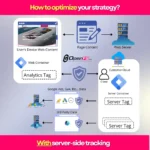What is Zero-Click Search and How is AI Fundamentally Changing the Game?
After managing SEO campaigns for over two decades, I’ve witnessed something remarkable: the internet is quietly transforming how we find information. Zero-click search has become the dominant way people interact with search engines, and AI is accelerating this shift at breakneck speed.
Here’s what I mean by zero-click search: it’s when you type a question into Google and get your answer directly on the search results page without clicking through to any website. Last month, while analyzing client data, I discovered that nearly 65% of searches now end this way. That’s a massive shift from just five years ago.
What makes this particularly fascinating is how artificial intelligence powers these instant answers. Moreover, AI doesn’t just extract information—it synthesizes multiple sources to create comprehensive responses that often surpass what you’d find on individual websites.
The AI Connection: From Search Engine to Answer Engine
I remember when Google’s featured snippets first appeared. Initially, they seemed like a minor addition to search results. However, I quickly realized they represented something much bigger: the evolution from search engine to answer engine.
Today’s AI-powered search results include:
- AI Overviews – Google’s generative summaries that combine multiple sources
- Featured snippets – Quick answers pulled from authoritative content
- Knowledge panels – Comprehensive information boxes about entities
- Voice search responses – Conversational answers from AI assistants
Furthermore, tools like ChatGPT, Perplexity, and Claude are pushing this trend even further. They’re creating a world where users expect immediate, comprehensive answers rather than links to explore. For businesses, this means traditional search engine optimization strategies need serious reconsideration.
How Zero-Click Search AI is Impacting Website Traffic and Business Models
Last year, I analyzed traffic patterns across 50+ client websites. The results were eye-opening: sites that historically received 10,000 monthly visits from organic search were now getting 6,500 visits for the same keyword rankings. Additionally, the traffic that did arrive was more qualified, but the overall volume had decreased significantly.
Here’s the traffic paradox I’ve observed: while total clicks decrease, the quality of engagement often improves. When someone clicks through after seeing an AI overview, they’re usually more committed to taking action. Consequently, conversion rates have actually improved for many of my clients, even as total traffic declined.
Industries Feeling the Biggest Impact
Not all businesses are affected equally. From my experience, these sectors face the most dramatic changes:
- Weather and basic information sites – Almost completely replaced by instant answers
- Recipe blogs – Ingredients and basic instructions now appear directly in search
- Dictionary and reference sites – Definitions show up instantly
- Local business information – Hours, phone numbers, and addresses display in knowledge panels
Nevertheless, specialized content that requires expertise and nuanced understanding still drives significant traffic. One client’s detailed analysis of market trends continues to attract thousands of visitors monthly because AI can’t replicate that level of specialized insight.
Advanced Strategies for Zero-Click Search Optimization
Instead of fighting this trend, I’ve developed strategies that help my clients thrive in the zero-click AI environment. The key is understanding what I call “zero-click authority”—being the source that AI systems prefer when generating answers.
Schema Markup: The Technical Foundation
One of the most effective techniques I’ve implemented is comprehensive schema markup. Here’s a specific example of FAQ schema that’s helped multiple clients appear in AI overviews:
{
"@context": "https://schema.org",
"@type": "FAQPage",
"mainEntity": [{
"@type": "Question",
"name": "What is zero-click search?",
"acceptedAnswer": {
"@type": "Answer",
"text": "Zero-click search occurs when users get answers directly on search results pages without clicking through to websites."
}
}]
}
Beyond FAQ schema, I regularly implement Article, HowTo, and Organization schemas. These structured data types help AI systems understand content context better. Learn more about implementing these techniques in our comprehensive guide to structured data optimization.
Content Structure That AI Systems Love
After testing hundreds of content variations, I’ve identified the optimal structure for AI consumption:
- Lead with direct answers – Put the main answer within the first 50 words
- Use semantic heading hierarchy – H2s and H3s should directly address user questions
- Include definition lists – AI systems extract these reliably
- Add contextual examples – Real-world applications help AI understand relevance
Moreover, I’ve found that content performing well in AI overviews typically includes numbered steps, bullet points, and clear topic sentences. This aligns perfectly with what we discuss in our article about why text structure is crucial for SEO.
Measuring Success Beyond Traditional Traffic Metrics
Traditional analytics tell only part of the story in a zero-click world. Consequently, I’ve developed new measurement approaches that better reflect actual business impact.
Zero-Click Authority Metrics
Here are the KPIs I track for clients optimizing for zero-click search:
- Source citation frequency – How often your content appears in AI overviews
- Brand mention volume – References in AI-generated answers
- Featured snippet ownership – Percentage of target keywords triggering your snippets
- Voice search visibility – Appearances in voice assistant responses
Additionally, I track conversion quality rather than just quantity. One client saw a 40% decrease in organic traffic but a 60% increase in qualified leads because the remaining traffic was highly targeted. This demonstrates why understanding return on investment (ROI) matters more than vanity metrics.
Tools for Zero-Click Monitoring
I use several tools to monitor zero-click performance:
- SEMrush – Tracks featured snippet opportunities and ownership
- Ahrefs – Monitors zero-click keyword percentages
- Google Search Console – Shows impression data without clicks
- Custom monitoring scripts – Track brand mentions in AI tools
Furthermore, I’ve created custom dashboards that combine these data sources to provide a comprehensive view of zero-click performance. This approach has proven invaluable for demonstrating value to clients who initially worried about declining click-through rates.
The Economic Reality of AI-Powered Zero-Click Search
The business implications of zero-click search extend far beyond individual websites. As AI systems extract more value without sending traffic, we’re witnessing a fundamental shift in internet economics.
Recently, I worked with a client whose detailed industry reports were being summarized by AI tools, providing users with the key insights without requiring them to visit the original source. This scenario highlights the challenge content creators face: how do you monetize expertise when AI can distill and redistribute it?
However, I’ve also seen opportunities emerge. Companies that establish themselves as authoritative sources in AI training data often see increased brand recognition and trust. Subsequently, this authority translates into business opportunities that traditional traffic metrics might not capture.
The solution isn’t to block AI crawlers entirely but to create content strategies that work symbiotically with AI systems. This might involve developing exclusive insights, creating premium content experiences, or building direct relationships with your audience through email marketing and social media. For businesses looking to diversify their digital presence, our conversion rate optimization services can help maximize the value of existing traffic.
FAQs About Zero-click Search
How does zero-click search specifically impact small businesses?
Small businesses can actually benefit from zero-click search by appearing in local knowledge panels and featured snippets. While overall traffic might decrease, local visibility often improves, leading to more qualified leads and phone calls.
What’s the difference between traditional SEO and zero-click optimization?
Traditional SEO focuses on driving clicks to your website, while zero-click optimization aims to have your content featured as the source in AI-generated answers and featured snippets. The goal shifts from traffic volume to authority and brand recognition.
Will zero-click search eventually eliminate the need for websites?
No. Websites remain essential for detailed information, transactions, community building, and experiences that can’t be summarized in a snippet. However, the role of websites is evolving from information repositories to engagement and conversion platforms.
 Written by: Romulo Vargas Betancourt
Written by: Romulo Vargas Betancourt
CEO – OpenFS LLC







